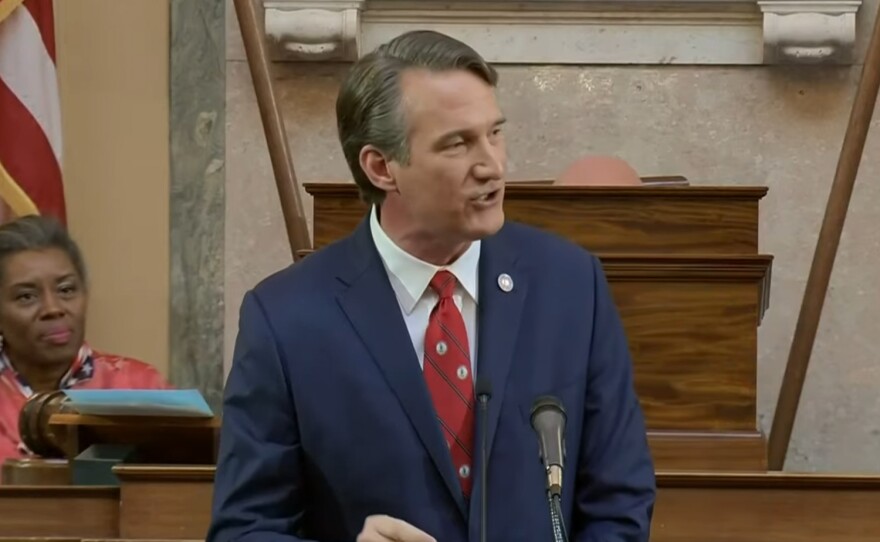Correction: This article previously stated that the General Assembly committed $850 billion to universal broadband in Virginia. The correct figure is $850 million. We have updated the article and apologize for the error.
Newly inaugurated Gov. Glenn Youngkin continued themes from his campaign, including the removal of “Critical Race Theory” from Virginia’s schools and increased investment in law enforcement, during his first address before the state’s legislature on Monday.
Youngkin also pledged to increase the responsiveness and effectiveness of the state government, saying he would leverage his business experience to increase bureaucratic efficiency. He promised to increase outside investment in Virginia, claiming it’s being outcompeted by other Southern states.
“We’re going to repeal needless regulations. We’re going to invest in job training. We’re going to foster innovation. And we’re going to win the competition for jobs and corporate relocations,” he said. “To make sure we don’t lose the next advanced battery manufacturing plant after seeing several go to Kentucky, Tennessee, North Carolina and Georgia.”
That statement comes in contrast to former Gov. Ralph Northam’s claim during his legislative address last week that under his administration, Virginia had seen its greatest period of economic investment. PolitiFact VA rated that statement “Mostly True.”
Northam’s administration announced over $81.4 billion in corporate investment, more than quadruple that of any of his predecessors, but PolitiFact noted that announced deals sometimes fall through or deliver less investment than promised. Much of that investment came in capital-intensive industries, such as data centers, meaning that despite the high dollar value, more jobs were announced under previous administrations.
Youngkin promised to bring universal broadband to the state, claiming previous administrations left rural Virginia behind. The General Assembly, however, committed $850 million in state and federal money to universal broadband last year, along with over $1 billion in private and local government funds.
Youngkin continued his call to lower taxes; he’s thrown his support behind ending the grocery tax, delaying an increase in the gas tax and doubling the standard deduction for state income taxes. He claims that a record state budget surplus is proof Virginia over-taxes its citizens, though economists note the state is near the median for tax rates.
“Virginians are struggling with the high cost of living in a commonwealth with skyrocketing housing costs, rising fuel prices and the silent wage theft of inflation,” Youngkin said. “There are economic fundamentals we don’t control in Virginia, that must be dealt with at the federal level.”
“But there is one vital thing we can do to help Virginians. And that is remove some of the tax burden added on top of rising prices for groceries, gasoline and housing.”
Economists have also noted that Virginia’s cost of living is near the median, but housing affordability remains a major issue, largely driven by a lack of supply. Energy and food have seen rapid price rises recently, though both are historically known for high price volatility.
Youngkin also pledged to increase state funding for law enforcement, including $100 million for a new state police training facility and $26 million in state funding for police departments.
“It’s time to take down the temperature around discussions of policing. The solution is constructive engagement and dialogue. Not inadequate funding which creates more lawlessness,” he said.
Violent crime, especially homicide, has increased in Virginia since the COVID-19 pandemic started in 2020, something Youngkin has partially attributed to police agencies struggling to fill officer positions.
A review of recent research on how policing affects crime rates, conducted by the Richmond branch of the Federal Reserve last year, found that increases in police presence have been shown to drive down crime. However, the conclusion of the article contained a caveat.
"Crime is an outcome of multiple factors. Education, employment opportunities, poverty, access to housing and health services, food deserts, and many other factors play important and complementary roles in determining crime levels," the study said. "A holistic and comprehensive approach to address the problem of crime prevention seems to be the most reasonable course of action."
The new governor’s promise to increase the size of law enforcement included schools, where Youngkin called for ensuring the presence of school resource officers. He says the move would increase “school safety,” though many activists argue that in-school police officers contribute to the school-to-prison pipeline.
He also claimed that Virginia’s schools are failing their students, pointing to studies that have shown the state has the lowest nationwide standards on some standardized tests. On national standardized tests, however, Virginia students perform near the top. Youngkin said he would strengthen standards and increase teacher pay to improve school performance.
Continuing another campaign theme, Youngkin promised to increase parental oversight of the school system.
“My message to parents is this, you have a fundamental right, enshrined in law by this General Assembly, to make decisions with regard to your child’s upbringing, education and care. And we will protect and reassert that right,” he said.
He called on lawmakers to re-introduce a bill previously vetoed by former Democratic Gov. Terry McAuliffe that would require teachers to notify parents before sexually explicit content is taught in schools.
Youngkin also touted a slew of executive orders he signed on his first day in office, including one that says parents may opt their children out of local school mask mandates. Several localities, including Richmond and Henrico, have already said they will continue to enforce their mandates.
The Omicron variant has driven state records for COVID-19 cases, and they are highly concentrated among unvaccinated Virginians. Youngkin strongly encouraged Virginians to get vaccinated and boosted but also pledged to fight a federal vaccine mandate for healthcare workers.
In their response to Youngkin’s speech, legislative Democrats claimed that despite Youngkin’s talk of state modernization, his policies would cause the state to move backward. House Minority Leader Eileen Filler-Corn (D-Alexandria) pointed to Youngkin’s mask mandate repeal as proof of that.
“We must do everything we can to safely keep our kids in school. Democrats worked hard to ensure all 132 divisions were open for in person learning. Governor Youngkin's day one action to remove mask requirements is irresponsible and puts all of that in jeopardy,” she said.
She also criticized Republican lawmakers for introducing bills that would stop the state’s progressive minimum wage increases and curtail early voting.



